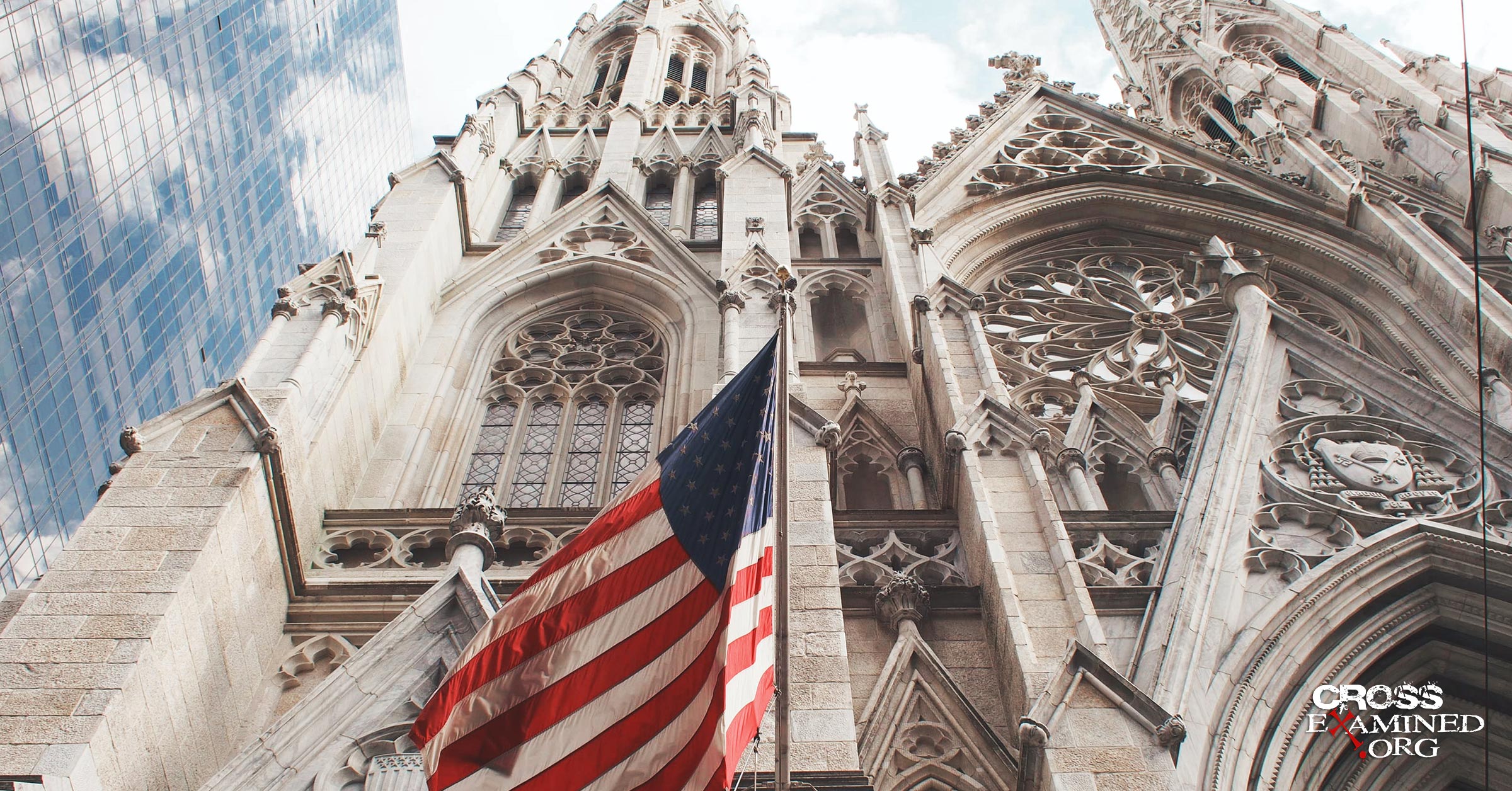By Jason Jiménez
In 1830, upon arriving to North America from France, Alexis de Tocqueville wrote, “The religious aspect of the country was the first thing that struck my attention; and the longer I stayed there, the more I perceived the great political consequences resulting from this new state of things. In France, I had almost always seen the spirit of religion and the spirit of freedom marching in opposite directions. But in America, I found they were intimately united and that they reigned in common over the same country.”[1] The Constitution of North Carolina (1776) proclaims: “…all men have a natural and unalienable right to worship Almighty God according to the dictates of their own consciences.”[2]
It is astonishing to think that despite all the evidence indicating our nation was founded on Judeo-Christian truths, America continues to reject the obvious. Many of the secular advancements to replace religious discussion from the public square come from employing “separation of church and state” and the First Amendment as legal principles penned by Jefferson. Secularists (non-religious) want us to believe that Jefferson allegedly supported the idea that there was no place for any religious reference among the citizenry and that religious disturbance was not to be tolerated in the public affairs of life. They incite these false views and misrepresentation of the facts because they want us to buy into the lie that America has always been a secular nation. However, contrary to popular belief, what we actually find in history is quite a different story regarding Jefferson’s viewpoints and the role Christianity played in shaping America. With historical objectivity as our guide, let us settle the truth about the “separation of church and state” once and for all.
Who Phrased the Infamous Phrase?
In reference to the phrase “a wall of separation between church and state,” we can indeed attribute that to Thomas Jefferson. However, we must do so in the proper context. Jefferson was not the originator of this phrase, but it was actually used as a famous metaphor by ministers in England in the 1500s, and eventually in America in the 1600s. After periods of state control and corruption of religion, an early Methodist bishop by the name of Charles Galloway insisted that there ought not to be any intrusion of governmental matters with ecclesiastical ones. Rev. Richard Hooker was actually the first to use the phrase, “separation of…Church and Commonwealth” under the reign of King Henry VIII of England. (The phrase “separation of church and state” originated from the Pilgrims’ religious flight from England under the ecclesiastical supremacy of Queen Elizabeth). The Pilgrims fled to Holland and eventually settled in America where they stressed that the government had no right to “compel religion, to plant churches by power, and to force a submission to the ecclesiastical government by laws and penalties.”[3]
Therefore, the purpose of separation was always to protect the church from interference by the government – not to protect the government from the church.
What Did Our Founders Believe?
The First Amendment is essentially divided up into two clauses. The first being the Establishment Clause: “Congress shall make no law respecting an establishment of religion;” and the second being the Free Exercise Clause: “or prohibiting the free exercise thereof; or abridging the freedom of speech, or of the press; or the right of the people peaceably to assemble, and to petition the Government for a redress of grievances.”
But what exactly is the intended meaning of words like “establishment,” “religion,” “prohibit,” and “free exercise?”
Well, the Framers made it abundantly clear from the start that Congress, not individual states, is limited in its capacity to establish, exercise, and even disestablish a state-run religion. Additionally, the Establishment Clause is the one that prohibits Congress from having jurisdiction or enforcement over the religious freedoms expressed in public life, and, it is the Free Exercise Clause that allows the state (i.e., Congress) to protect these religious freedoms and expressions. Historically speaking, the view of that day was that the Church (religion) and State (government) were two separate spheres but with adjoined purposes.
Government was to protect the civility for the people. Religion was to enhance the morality and vitality of the people.
On July 13, 1787, the Continental Congress enacted the Northwest Ordinance, and in it they prodigiously professed: “Religion, morality and knowledge, being necessary to good government and the happiness of mankind, schools and the means of education shall be forever encouraged.”[4]
Those in attendance included George Washington, James Madison, Alexander Hamilton, and Benjamin Franklin. These men are considered the most prominent figures in the development of the U. S. Constitution and the ratification of the Bill of Rights. George Washington was not only the President of the Convention which created the U.S. Constitution, but he was also the President of the United States who pushed for the creation of the Bill of Rights to enhance the principles and protections of the liberties expressed in the U.S. Constitution. We find no mentioning of a privatized faith of any sort in Washington’s writings or addresses to the American people.
What Did Jefferson Believe?
It’s important to point out that though Jefferson was the architect of the Declaration of Independence, he was not a framer of the U.S. Constitution.[5] Jefferson was in France (acting as Ambassador) at the time of the writing of the U.S. Constitution and the Bill of Rights. On June 19, 1802, Jefferson wrote a letter in response to an article he had received from Dr. Joseph Priestly who accredited the success of the U.S. Constitution to him. Jefferson wrote:
One passage in the paper you enclosed me must be corrected. It is the following, ‘And all say it was yourself more than any other individual, that planned and established it,’ i. e., the Constitution. I was in Europe when the Constitution was planned, and never saw it till after it was established.[6]
Upon Jefferson becoming President in 1801, many Baptists were strong supporters of his Anti-Federalist positions and sought counsel from the President. They did so based upon the reading of the Kentucky Resolution of 1798 whereby Jefferson declared his beliefs of interpreting the U.S. Constitution:
That it is true as a general principle, and is also expressly declared by one of the amendments to the Constitutions, that “the powers not delegated to the United States by the Constitution, our prohibited by it to the States, are reserved to the States respectively, or to the people”; and that no power over the freedom of religion, freedom of speech, or freedom of the press being delegated to the United States by the Constitution, nor prohibited by it to the States, all lawful powers respecting the same did of right remain, and were reserved to the States or the people: that thus was manifested their determination to retain to themselves the right of judging how far the licentiousness of speech and of the press may be abridged without lessening their useful freedom, and how far those abuses which cannot be separated from their use should be tolerated, rather than the use be destroyed….[7]
According to this and other public remarks by Jefferson, the Danbury Baptists knew the President opposed governmental control and interference in religious matters of the church. In October 7, 1801, the Danbury Baptist Association of Connecticut wrote to President Jefferson about their concern that religious liberty is a God-given right, not a privilege granted by the government. They realized that if the government granted such religious freedoms to the people, then that would mean that it could, at any given time, remove them. In response to the Danbury Baptists, Jefferson replied on January 1, 1802:
Believing with you that religion is a matter which lies solely between man and his God, that he owes account to none other for his faith or his worship, that the legislative powers of government reach actions only, and not opinions, I contemplate with sovereign reverence that act of the whole American people which declared that their legislature would “make no law respecting an establishment of religion, or prohibiting the free exercise thereof,” thus building a wall of separation between Church and State. Adhering to this expression of the supreme will of the nation in behalf of the rights of conscience, I shall see with sincere satisfaction the progress of those sentiments which tend to restore to man all his natural rights, convinced he has no natural right in opposition to his social duties [emphasis mine].[8]
On subsequent occasions, Jefferson articulated this same position to others as he did to the Danbury Baptists. Jefferson wrote, “I consider the government of the U.S. as interdicted by the constitution from intermeddling with religious institutions, their doctrines, discipline, or exercises. This results not only from the provision that no law shall be made respecting the establishment, or free exercise of religion, but from that also which reserves to the states the powers not delegated to the U.S.”[9] John Adams agreed with Jefferson, stating, “We have no government armed with power capable of contending with human passions unbridled by morality and religion . . . Our Constitution was made only for a moral and religious people. It is wholly inadequate to the government of any other.”[10]
Jefferson and the Danbury Baptists were simply addressing the dangers of the government’s marginalizing religious freedoms, not the other way around. Once again, it is perfectly clear that the separation doctrine was a campaign of the church to remove government oversight, not the government trying to remove the Church from public life.
When Did It Become Misinterpreted?
In 1878 the U.S. Supreme Court used Jefferson’s “separation” metaphor as part and parcel to the ruling that it is the government’s duty to protect rather than limit the free exercise of religious preference. In fact, the Court took it a step further by invoking Jefferson’s famous Virginia Act of Religious Freedom of 1786 in order to point out a few exceptions whereupon the government does have authority to intervene on religious matters. David Barton interprets the Court’s ruling of Jefferson’s statute as such,
That Court (and others) then identified a handful of actions that, if perpetrated in the name of religion, the government did have legitimate reason to limit, including bigamy, concubinage, incest, child sacrifice, infanticide, parricide, and other similar crimes. But the government was not to impede traditional religious expressions in public, such as public prayer, public display of religious symbols, public use of Scriptures, acknowledgement of God in public events, and so on. In short, the separation of Church and State existed not to remove or secularize the free exercise of religion but rather to preserve and protect it, regardless of whether it was exercised in private or public life.[11]
Thus, according to the Founders, religion played a virtuous role in shaping the values of a nation governed by the moral character of the people and for the people.
And yet in a landmark decision by the U.S. Supreme Court in 1947, the High Court declared that the Establishment Clause of the First Amendment not only applied to the imposed limitations of the federal government, but to States as well. Justice Black openly declared, “In the words of Jefferson, the clause against establishment of religion by law was intended to erect ‘a wall of separation between Church and State.’”[12]
Over a century and a half later, the U.S. Supreme Court seized Jefferson’s phrase “wall of separation” and applied an anti-religious interpretation to the First Amendment. It was no longer a safeguard from intrusion or obstruction on the part of Congress, but now a flipped version that merged the Establishment Clause of the First Amendment with the due process law of the Fourteenth Amendment that fundamentally changed the course of religion in public life. Since the pronouncement by the U.S. Supreme Court in 1947, almost every case addressing religious and public separation cite Jefferson as the architect of both the First Amendment and the law of “separation of church and state.”
However, as already shown, this is not only a fabrication of American history, but it’s also a poor rendering of the First Amendment. Spalding clarifies, “What this reconciliation of religion and politics did not mean is equally important, and crucial to understanding the meaning and significance of religious liberty: This official separation of church doctrine and the new federal government never meant—was never intended to imply—the separation of religion and politics, or the expunging of religion from public life.”[13] That’s precisely why former Chief Justice, William Rehnquist (served 1986-2005), admittedly observed, “The metaphor of a wall of separation is bad history and worse law. It has made a positive chaos out of court rulings. It should be explicitly abandoned.”[14]
Based on the examination of the origin and historical meaning of the separation doctrine, it’s obvious that it has always been the government that has jumped the “wall of separation” and not the Church. But because of the mishandling of our Founders’ religious (mainly Christian) viewpoints, particularly those of Jefferson, and robbing the government of its proper role to protect religion in public life, secularism has altered the course of American history. As a result, secularism has been widely successful in removing God, redefining truth, and is well on its way to replacing Christianity.
Notes
[1] ALEXIS DE TOCQUEVILLE, HENRY REEVE, AND JOHN C. SPENCER, DEMOCRACY IN AMERICA (NEW YORK: ALLARD AND SAUNDERS, 1838), 319.
[2] “NORTH CAROLINA CONSTITUTION OF 1776,” BELIEFNET, HTTP://WWW.BELIEFNET.COM/RESOURCELIB/DOCS/169/NORTH_CAROLINA_CONSTITUTION_OF_1776_1.HTML.
[3] DAVID BARTON, THE JEFFERSON LIES: EXPOSING THE MYTHS YOU ALWAYS BELIEVED ABOUT THOMAS JEFFERSON (NASHVILLE: THOMAS NELSON, 2012), 120.
[4] “THE NORTHWEST ORDINANCE, ARTICLE III,” NORTHWEST ORDINANCE, HTTP://WWW.NORTHWESTORDINANCE.ORG/.
[5] JEFFERSON WAS NOT THE ARCHITECT OF THE FIRST AMENDMENT (READ THE LETTER TO MADISON ON DECEMBER 20, 1787), AND HIS LETTER USING THE PHRASE “WALL OF SEPARATION” WAS WRITTEN OVER TEN YEARS AFTER THE FIRST AMENDMENT WAS RATIFIED!
[6] H. A. WASHINGTON, THE WRITINGS OF THOMAS JEFFERSON: BEING HIS AUTOBIOGRAPHY, CORRESPONDENCE, REPORTS, MESSAGES, ADDRESSES, AND OTHER WRITINGS, OFFICIAL AND PRIVATE, PUB. BY THE ORDER OF THE JOINT COMMITTEE OF CONGRESS ON THE LIBRARY, FROM THE ORIGINAL MANUSCRIPTS, DEPOSITED IN THE DEPARTMENT OF STATE (WASHINGTON, D.C.: TAYLOR & MAURY, 1853), 441.
[7] “THE KENTUCKY RESOLUTIONS OF 1798,” CONSTITUTION SOCIETY, LAST UPDATED NOVEMBER 4, 2011, HTTP://WWW.CONSTITUTION.ORG/CONS/KENT1798.HTM.
[8] “AMENDMENT I (RELIGION), DOCUMENT 58, THOMAS JEFFERSON TO DANBURY BAPTIST ASSOCIATION,” THE FOUNDER’S CONSTITUTION, HTTP://WWW.PRESSPUBS.UCHICAGO.EDU/FOUNDERS/DOCUMENTS/AMENDI_RELIGIONS58.HTML.
[9] “AMENDMENT I (RELIGION), DOCUMENT 60, THOMAS JEFFERSON TO REV. SAMUEL MILLER,” THE FOUNDER’S CONSTITUTION, HTTP://WWW.PRESS-PUBS.UCHICAGO.EDU/FOUNDERS/DOCUMENTS/AMENDI_RELIGIONS60.HTML.
[10] “MESSAGE FROM JOHN ADAMS TO THE OFFICERS OF THE FIRST BRIGADE OF THE THIRD DIVISION OF THE MILITIA OF MASSACHUSETTS,” BELIEFNET, HTTP://WWW.BELIEFNET.COM/RESOURCELIB/DOCS/115/MESSAGE_FROM_JOHN_ADAMS_TO_THE_OFFICERS_OF_THE_FIRST_BRIGADE_1.HTML.
[11] BARTON, THE JEFFERSON LIES, 126-127.
[12] “MCCOLLUM V. BOARD OF EDUCATION – 333 U.S. 203 (1948),” JUSTIA US SUPREME COURT CENTER, HTTP://WWW.SUPREME.JUSTIA.COM/CASES/FEDERAL/US/333/203/CASE.HTML.
[13] MATTHEW SPAULDING, WE STILL HOLD THESE TRUTHS: REDISCOVERING OUR PRINCIPLES, RECLAIMING OUR FUTURE (WILMINGTON, DE: ISI BOOKS, 2009), 56.
[14] “REHNQUIST’S DISSENT IN WALLACE V JAFFREE (1985),” BELCHER FOUNDATION, HTTP://WWW.BELCHERFOUNDATION.ORG/WALLACE_V_JAFFREE_DISSENT.HTM.
Recommended resources related to the topic:
Legislating Morality: Is it Wise? Is it Legal? Is it Possible? by Frank Turek (Book, DVD, Mp3, Mp4, PowerPoint download, PowerPoint CD)
American Apocalypse MP3, and DVD by Frank Turek
Correct, NOT Politically Correct: How Same-Sex Marriage Hurts Everyone (Updated/Expanded) downloadable pdf, Book, DVD Set, Mp4 Download by Frank Turek
Economics, Environment, Political Culture CD by Kerby Anderson
Government Ethics CD by Kerby Anderson
The Case for Christian Activism MP3 Set, DVD Set, mp4 Download Set by Frank Turek
You Can’t NOT Legislate Morality mp3 by Frank Turek
Economics, Environment, Political Culture CD by Kerby Anderson
Jason Jimenez is the founder of STAND STRONG Ministries and faculty member at Summit Ministries. He is a pastor, apologist, and national speaker who has ministered to families for over twenty years. In his extensive ministry career, Jason has been a Children’s, Student, and College Pastor, and he has authored close to 10 books on topics related to apologetics, theology, and parenting.
Original Blog Source: https://bit.ly/3aEZ3pm







